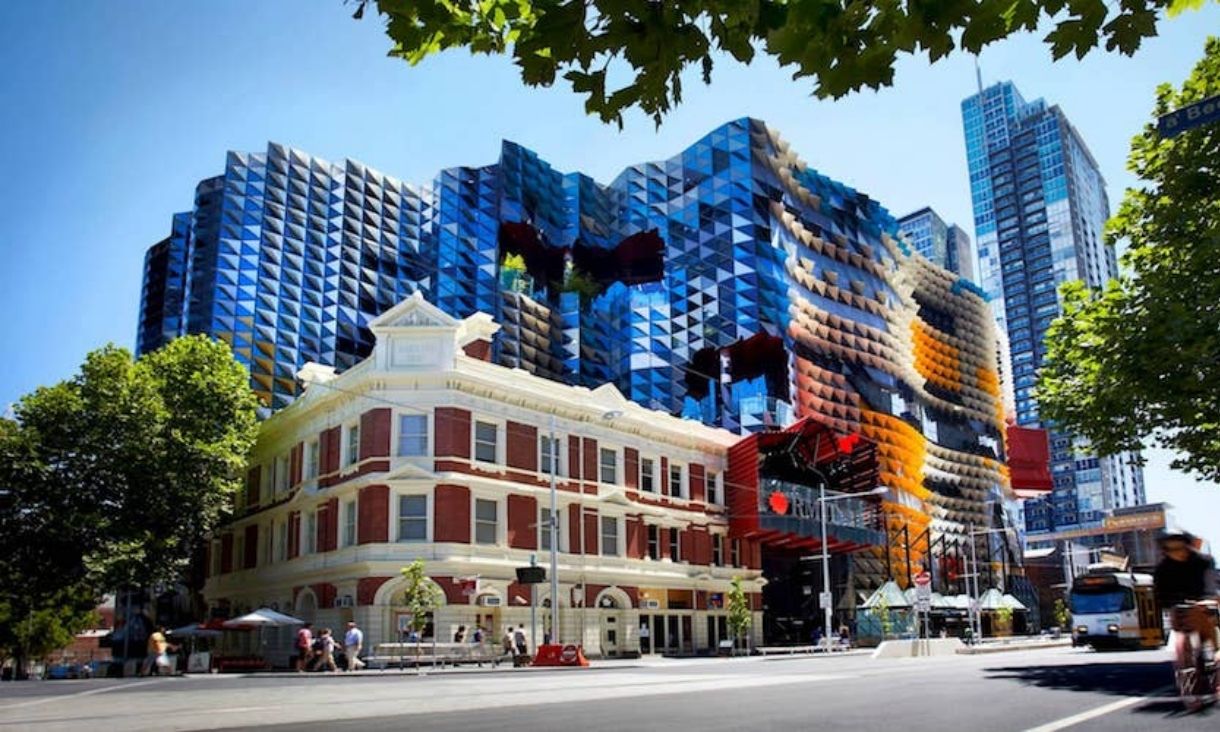

We offer some of the best courses in the world, with several programs recognised in the Top 50 globally. Making a positive contribution to the communities we serve is at the heart of who we are and what we do at RMIT. We are proud to be recognised on the world-stage and in Australia as a leading institution in environmental, economic and social impact.
=123 globally
10 in Australia
251-300 globally
=14 in Australia


=80 globally overall
=54 globally social impact
=31 globally governance impact
5 overall globally
1 Reduced inequalities
5 Decent work and economic growth
11 Partnership for the goals
26 Art & Design
21 Architecture/Built Environment
10 Business
Administration
27 Civil Engineering
30 Aerospace Engineering
37 Food Science & Technology
44 Finance
45 Textile Science & Engineering


At RMIT, teaching, research, and engagement are central to making an impact and creating life-changing experiences for our students.
There are many global ranking systems, but the most influential for prospective students, researchers, industry and government are QS World University Rankings, Times Higher Education World University Rankings and the Academic Ranking of World Universities (ARWU) - ShanghaiRankings. RMIT continues to perform strongly in these rankings systems each year.
QS World University Rankings ranks over 1,500 institutions and is the only ranking system to emphasise employability and sustainability. It uses objective research data and survey information from governments, academics and employers globally.
QS releases three rankings each year:
Ranking |
RMIT rank – world |
RMIT rank – Australia |
|---|---|---|
| QS University Rankings |
||
| Overall | =123 | 10 |
| Academic reputation | 210 | 10 |
| Employer reputation | 192 | 8 |
| Citations per faculty (academic) | 122 | 15 |
| International faculty (academic) | 45 | 2 |
| International students | 116 | 12 |
| QS Sustainability | ||
| Overall | =80 | 11 |
| Environmental impact | =138 | 12 |
| Social impact | =54 | 9 |
| Governance impact | =31 | 6 |
| QS Subject Rankings | ||
| Top 50 | ||
| Architecture / Built Environment | 21 | 1 |
| Art and Design | 26 | 1 |
| Top 100 | ||
| Materials Science | =77 | 6 |
| Communication & Media Studies | 51-100 | 6 |
| Library & Information Management | 51-100 | 6 |
| Geography | 51-100 | 7 |
| Marketing | 51-100 | 7 |
| Engineering - Civil & Structural | 51-100 | 8 |
| Top 150 | ||
| Engineering - Mechanical, Aeronautical & Manufacturing | =110 | 7 |
| Engineering - Electrical & Electronic | =144 | 8 |
| Accounting & Finance | 101-150 | 9 |
| Performing Arts | 101-150 | 7 |
| Agriculture & Forestry | 101-150 | 10 |
| Top 200 | ||
| Business & Management Studies | =149 | 7 |
| Statistics & Operational Research | 155 | 8 |
| Economics & Econometrics | =161 | 10 |
| Computer Science & Information Systems | =167 | 10 |
| Mathematics | 151-200 | 8 |
| Nursing | 151-250 | 22 |
| Environmental Sciences | 151-200 | 12 |
| Physics & Astronomy | 151-200 | 8 |
THE assesses over 1,000 universities to help people understand the different missions and successes of institutions. It is the largest and most diverse ranking system and has an emphasis on research and impact.
THE releases two key rankings each year:
Ranking |
RMIT rank – world |
RMIT rank – Australia |
|---|---|---|
| THE Overall | 251-300 | =14 |
| International outlook | 87 | 8 |
| Research environment | 326 | 14 |
| Research quality | 267 | 25 |
| THE Impact | 5 | 3 |
| Reduced inequalities (SDG 10) | 1 | 1 |
| Decent work and economic growth (SDG 8) | 5 | 1 |
| Sustainable cities and communities (SDG 11) | 20 | 5 |
| Partnership for the goals (SDG 17) | 11 | 4 |
| Clean water and sanitation (SDG 6) | 10 | 7 |
| Responsible consumption and production (SDG 12) | 41 | 4 |
| Climate action (SDG 13) | 16 | 6 |
| Gender inequality (SDG 5) | 81 | n/a |
| THE Interdisciplinary Science | 22 | 1 |
ARWU ranks over 1,000 universities using six indicators - alumni and staff winning Nobel Prizes and Fields Medals, highly cited researchers selected by Clarivate, articles published in journals of Nature and Science, articles indexed in Science Citation Index Expanded™ and Social Sciences Citation Index™ in the Web of Science™, and per capita performance of a university.
Ranking |
RMIT rank – world |
RMIT rank – Australia |
|---|---|---|
| ARWU Overall | 301 - 400 (est 337) | 18 |
| Publications | 338 | 15 |
| Highly cited researchers | 270 | 18 |
| Nature and Science | 430 | 20 |
| Per capita performance | 220 | 26 |
| ARWU Subject Rankings | ||
| Top 50 | ||
| Business Administration | 10 | |
| Civil Engineering | 27 | |
| Aerospace Engineering | 30 | |
| Food Science & Technology | 37 | |
| Finance | 44 | |
| Textile Science & Engineering | 45 | |
| Top 100 | ||
| Communication | 76-100 | |
| Hospitality & Tourism Management | 76-100 | |
| Mechanical Engineering | 76-100 | |
| Top 150 | ||
| Automation & Control | 101-150 | |
| Environmental Science & Engineering | 101-150 | |
| Geography | 101-150 | |
| Instruments Science & Technology | 101-150 | |
| Materials Science & Engineering | 101-150 | |
| Metallurgical Engineering | 101-150 | |
| Nanoscience & Nanotechnology | 101-150 | |
| Transportation Science & Technology | 101-150 | |
| Top 200 | ||
| Chemistry | 151-200 | |
| Computer Science & Engineering | 151-200 | |
| Economics | 151-200 | |
| Energy Science & Engineering | 151-200 | |
| Law | 151-200 | |
| Management | 151-200 | |
| Public Health | 151-200 |
Published by US News & World Report, institutions from more than 100 other countries are ranked based on 13 indicators that measure academic research performance and global and regional reputations.
Ranking |
World |
Australia |
|---|---|---|
| Overall | 195 | 15 |
| Research reputation | ||
| Global | 215 | |
| Regional | 8 | |
CWTS Leiden Rankings provides insights into the scientific performance of more than 1,500 major tertiary institutions worldwide.
| Ranking | World | Australia |
|---|---|---|
| Mean normalised citation score | 67 | 5 |
| Impact | ||
| Total normalised score | 283 | 11 |
| Top 1% publications | 55 | 5 |
| Top 10% publications | 47 | 4 |
| Top 50% publications | 60 | 3 |
| Collaboration | ||
| Collaborative publications | 529 | 34 |
| International publications | 314 | 15 |
| Industry collaborations | 886 | 17 |
| Long distance collaborations | 31 | 13 |


RMIT University acknowledges the people of the Woi wurrung and Boon wurrung language groups of the eastern Kulin Nation on whose unceded lands we conduct the business of the University. RMIT University respectfully acknowledges their Ancestors and Elders, past and present. RMIT also acknowledges the Traditional Custodians and their Ancestors of the lands and waters across Australia where we conduct our business - Artwork 'Sentient' by Hollie Johnson, Gunaikurnai and Monero Ngarigo.
More information